This page was generated from
docs/Examples/Cpx_Cpx_Liq_Thermobarometry/Pyroxene_Ternary_Cpx_Example.ipynb.
Interactive online version:
.
Pyroxene Classification Diagrams
The function uses fields for the pyroxene ternary from Deer, Howie, and Zussman (1963).
This function relies heavily on the ternary plot package from Marc Harper et al. 2015 - https://github.com/marcharper/python-ternary, if you use these figures, you must cite that (Marc Harper et al. (2015). python-ternary: Ternary Plots in Python. Zenodo. 10.5281/zenodo.594435) as well as Thermobar.
You may have problems with this package if you have the separate “ternary” package installed (yes, there are python packages called ternary and python-ternary- Yay!). I (penny) got the error “module ternary has no attribute figure”, so had to uninstall the ternary I had through pip (pip uninstall ternary), and re-install python-ternary through conda in the command line “conda install python-ternary”. If you have everything in pip, or conda, keep in 1 environment, don’t follow my bad example here!
You can download the excel spreadsheet with Cpx data from: https://github.com/PennyWieser/Thermobar/blob/main/docs/Examples/Cpx_Cpx_Liq_Thermobarometry/Cpx_Liq_Example.xlsx
[ ]:
# if you havent already done it, pip install Thermobar
#!pip install Thermobar
[ ]:
# pip install python-ternary
import ternary
# We tested using ternary V.1.0.8
print(ternary.__version__)
[1]:
import matplotlib.pyplot as plt
import numpy as np
import pandas as pd
import Thermobar as pt
Load in some Cpx compositions
[2]:
out=pt.import_excel('Cpx_Liq_Example.xlsx', sheet_name="Sheet1")
my_input=out['my_input']
Liqs=out['Liqs']
Cpxs=out['Cpxs']
Lets transform these Cpx compositions into the 3 coordinates we need for plotting on our ternary diagrams.
We are plotting in Mg-Fe-Ca space, so En is simply Mg/(Mg+Fet+Ca) etc.
[3]:
cpx_comps_tern=pt.tern_points_px(px_comps=Cpxs)
Example 1
Lets draw the diagram first to show you options
(hold on, we’ll add data in a second)
Example 1a - Simplicest, no grid, no labels, trimming off the top to make a quadrilateral
[5]:
fig, tax = pt.plot_px_classification(figsize=(10, 5))
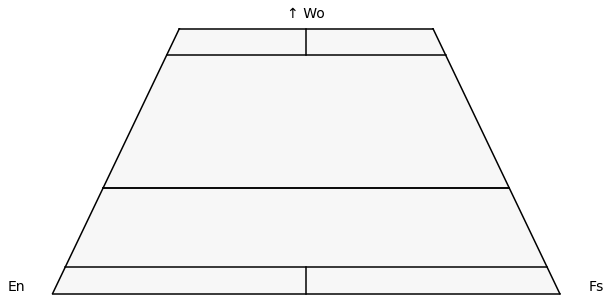
Example 1b - Lets keep the top!
[6]:
fig, tax = pt.plot_px_classification(figsize=(6,5), cut_in_half=False)
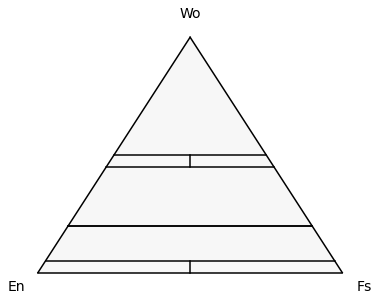
Example 1c- Lets add the field names on
You can change font size using fontsize_component_labels to match the fig size
[7]:
fig, tax = pt.plot_px_classification(figsize=(10, 5), labels=True,
fontsize_component_labels=12,
fontsize_axes_labels=20)
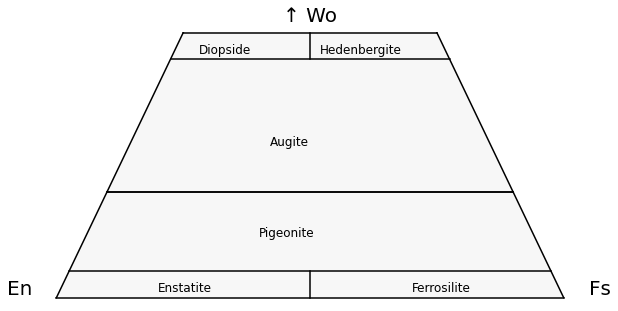
Example 1d - Lets add a grid
[8]:
fig, tax = pt.plot_px_classification(figsize=(10, 5), labels=True, fontsize_component_labels=12,
major_grid=True)
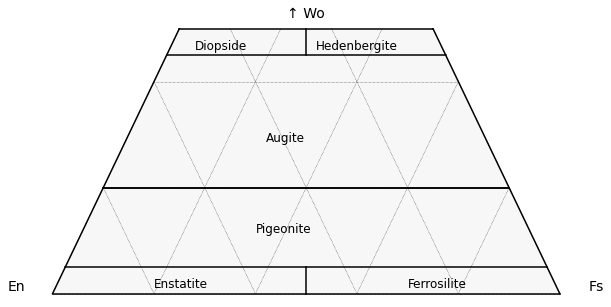
Example 1e - Lets add a minor grid
[9]:
fig, tax = pt.plot_px_classification(figsize=(10, 5), labels=True, fontsize_component_labels=12,
major_grid=True, minor_grid=True)
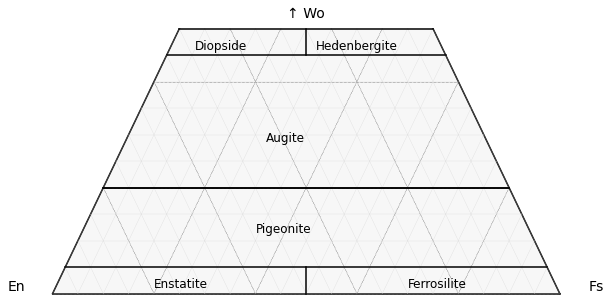
Example 2 - Lets add your data (simple to start!)
[10]:
# First, define the plot as above.
fig, tax = pt.plot_px_classification(figsize=(10, 5), fontsize_component_labels=12,
major_grid=True, minor_grid=True)
## Now feed in your data we calculated at the start in terms of ternary axes!
tax.scatter(
cpx_comps_tern,
edgecolor="k",
marker="^",
facecolor="red",
label='Label1',
s=90
)
[10]:
<AxesSubplot:>
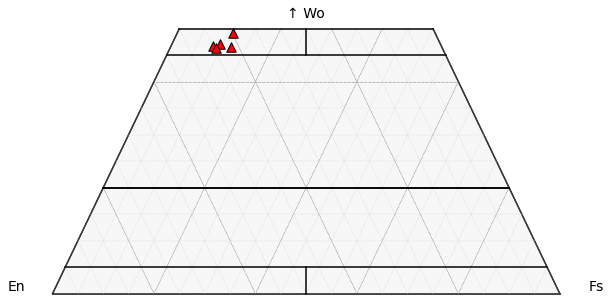
Example 3 - Lets color by Px Jd content
[11]:
fig, tax = pt.plot_px_classification(figsize=(12, 5), fontsize_component_labels=12,
major_grid=True, minor_grid=True)
# We need to calculate Cpx compositions to get Jd
cpx_comps=pt.calculate_clinopyroxene_components(cpx_comps=Cpxs)
tax.scatter(
cpx_comps_tern,
c=cpx_comps["Jd"],
vmin=np.min(cpx_comps["Jd"]),
vmax=np.max(cpx_comps["Jd"]),
s=100,
edgecolor="k",
marker="^",
cmap="hot",
colormap="hot",
colorbar=True,
cb_kwargs={"shrink": 0.5, "label": "Jd content"},
)
# Uncomment to save the figure.
#fig.savefig('Pyroxene_Class.png', dpi=200)
[11]:
<AxesSubplot:>
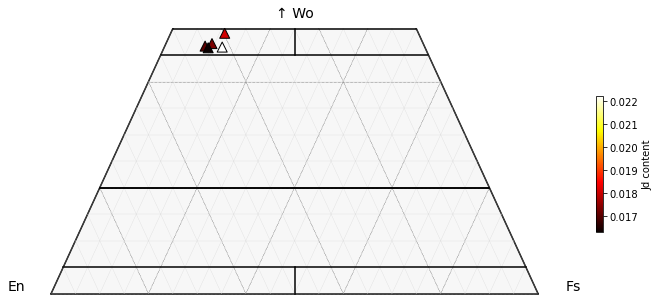
[ ]: